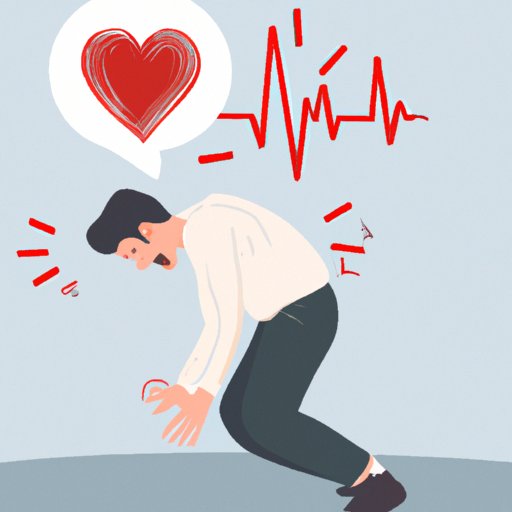
Introduction
Anxiety is a complex emotional state characterized by feelings of tension, nervousness, and apprehension. It can be triggered by a wide range of events and situations, from public speaking to financial stress to relationship struggles. Anxiety can be a natural response to stress, but it can also become a serious mental health condition when it interferes with daily functioning and quality of life.
The purpose of this article is to explore the physical health effects of anxiety, with a particular focus on the question of whether anxiety can actually lead to death. We’ll review the latest research on anxiety and mortality rates, discuss common physical symptoms caused by anxiety, and provide strategies for managing severe anxiety.
The Surprising Effects of Anxiety on Your Physical Health: Can Anxiety Actually Kill You?
While most of us are familiar with the emotional toll of anxiety, many people are surprised to learn that anxiety can also have serious physical health effects. Here are just a few examples:
- Chronic muscle tension and pain
- Headaches and migraines
- High blood pressure
- Heart palpitations
- Digestive issues, such as irritable bowel syndrome (IBS)
- Insomnia and other sleep disturbances
- Immune system dysfunction
- Suppressed appetite
- Weight fluctuations
With so many potential physical health effects, it’s not surprising that many people wonder whether anxiety can actually lead to death.
Anxiety and Mortality: Understanding the Connection
There is a growing body of research suggesting that anxiety may be linked to higher mortality rates. For example, one study from the Netherlands found that people with high levels of anxiety had a 33% greater risk of dying from any cause over a 10-year period than those with lower levels of anxiety. Another study from the US found that young adults with generalized anxiety disorder (GAD) had a significantly higher risk of death from cardiovascular disease compared to their peers without GAD.
While these studies suggest that there may be a link between anxiety and mortality rates, it’s important to note that the research is still in its early stages. Some experts argue that the connection between anxiety and mortality may be due to other factors, such as lifestyle habits that tend to co-occur with anxiety (such as smoking, poor diet, and lack of exercise) rather than anxiety itself.
When Anxiety Feels Life-Threatening: Coping Strategies for Severe Anxiety
For some people with anxiety, the symptoms can feel overwhelming and even life-threatening. Symptoms of severe anxiety may include:
- Panic attacks
- Difficulty breathing or shortness of breath
- Chest pain or tightness
- Fear of dying or losing control
- Inability to concentrate or focus
If you’re experiencing severe anxiety symptoms, there are several coping strategies that may help, including:
- Deep breathing exercises
- Progressive muscle relaxation
- Cognitive-behavioral therapy (CBT)
- Medication, such as benzodiazepines or beta-blockers
- Lifestyle changes, such as exercise and stress management techniques
It’s important to note that while these strategies can be helpful, they may not be sufficient in cases of severe anxiety. If you’re struggling with severe anxiety that interferes with your ability to function on a daily basis, it’s important to seek professional help from a mental health provider.
Anxiety-Related Health Scares: What You Need to Know
Many people with anxiety experience physical symptoms that can feel frightening and cause them to seek medical attention. Some common anxiety-related health scares may include:
- Chest pain or tightness
- Heart palpitations
- Shortness of breath
- Dizziness or faintness
- Nausea or stomach upset
- Headaches
If you experience any of these symptoms, it’s important to first rule out any underlying physical health conditions. However, if your doctor determines that your symptoms are caused by anxiety, there are several treatment options available:
- Talking therapies, such as CBT or psychotherapy
- Medication, such as selective serotonin reuptake inhibitors (SSRIs)
- Lifestyle changes, such as exercise and stress management techniques
Most importantly, it’s essential to remember that anxiety-related symptoms are not a sign of weakness or inadequacy. They are a common and understandable response to stress, and with the right treatment and support, they can be effectively managed.
From Panic Attacks to Heart Attacks: Understanding the Physical Toll of Anxiety
While most anxiety-related physical symptoms are not life-threatening, there are some serious manifestations of anxiety that can be deadly. For example:
- Panic attacks: These can cause intense fear and discomfort, as well as physical symptoms such as chest pain, shortness of breath, and dizziness. While panic attacks aren’t typically life-threatening, they can cause complications such as fainting or injury if they occur in high-risk situations (such as while driving).
- Heart attacks: There is growing evidence that anxiety may increase the risk of heart attacks and other cardiovascular problems, particularly in people with existing heart conditions.
Risk factors that may increase your likelihood of experiencing serious physical manifestations of anxiety may include:
- A history of heart disease or other cardiovascular problems
- Smoking
- Obesity or a sedentary lifestyle
- Family history of heart disease or anxiety disorders
To decrease your risk of experiencing serious anxiety-related health problems, it’s important to take steps to manage your anxiety effectively. This may include seeking professional treatment, making lifestyle changes such as exercising regularly and eating a healthy diet, and practicing stress management techniques such as meditation or yoga.
Conclusion
Anxiety can have serious physical health effects, and while the link between anxiety and mortality rates is still being studied, there is evidence to suggest that anxiety may be a risk factor for early death. If you’re struggling with anxiety, it’s important to seek professional help and explore coping strategies that work for you. Remember that anxiety-related symptoms are not a sign of weakness, and with the right support, you can manage your anxiety and improve your overall health and well-being.





